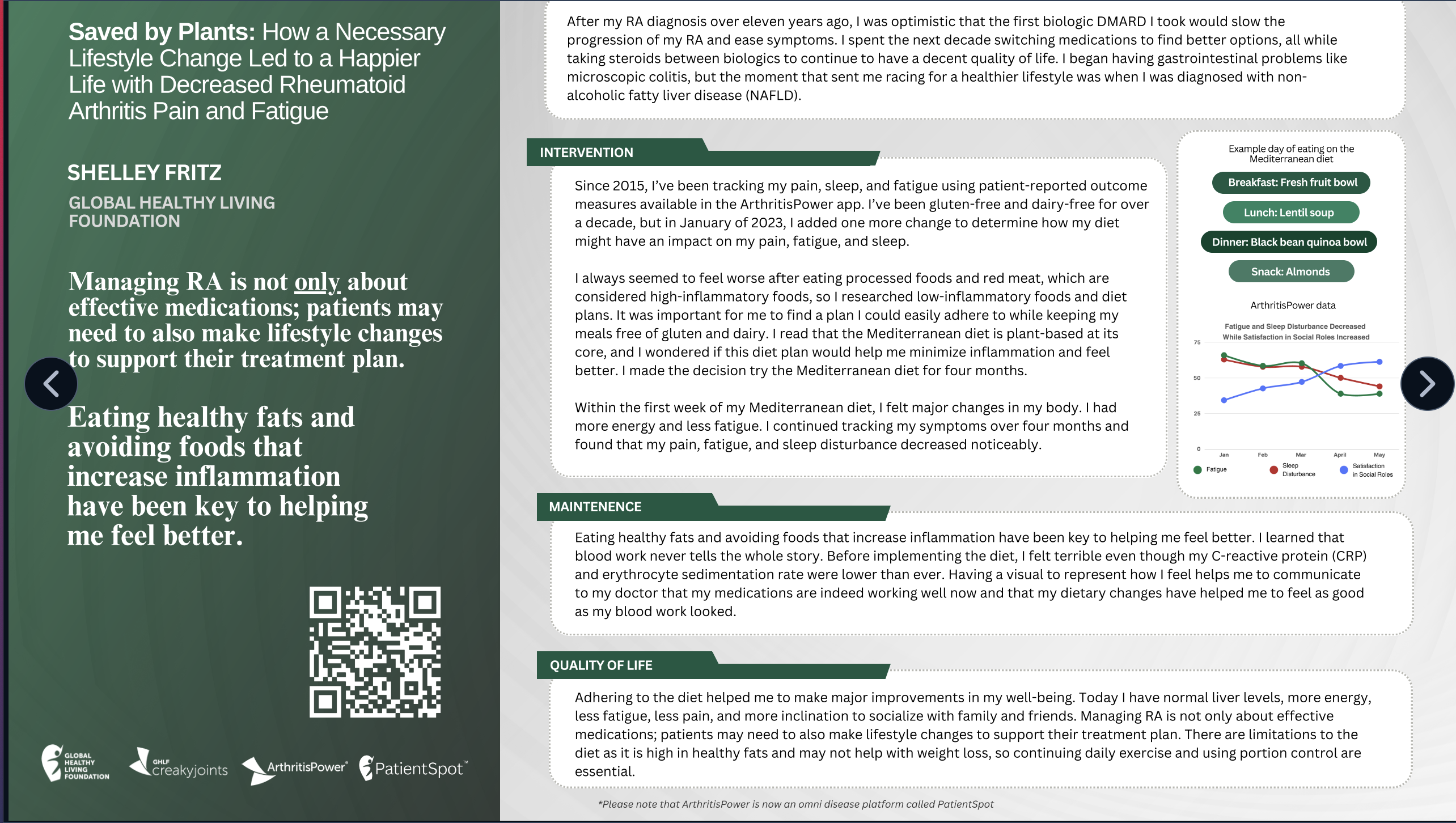

Almost 12 years ago, following my rheumatoid arthritis (RA) diagnosis, I clung to the hope that the initial biologic disease-modifying antirheumatic drug (DMARD) would halt the progression of my RA and ease my symptoms.
Over the next decade, I embarked on a medication-switching journey in search of better options, often using corticosteroids between biologics to maintain a reasonable quality of life. This path led to rapid and persistent weight gain, accompanied by gastrointestinal issues like microscopic colitis. However, a diagnosis of non-alcoholic fatty liver disease (NAFLD) was the turning point that led me toward a healthier lifestyle.
It felt like good timing when ACR released the 2022 American College of Rheumatology (ACR) Guideline for Exercise, Rehabilitation, Diet, and Additional Integrative Interventions for Rheumatoid Arthritis. In the guideline, a Mediterranean-style diet is conditionally recommended for those with RA as a means of decreasing inflammation that can cause pain and discomfort. I decided to embrace this nutritional plan and meticulously track my symptoms along the way.
Since 2015, I’ve been monitoring my pain, sleep, and fatigue through the ArthritisPower app (now called PatientSpot). In 2020, amidst increased isolation due to moving and the onset of the pandemic, I also began tracking my satisfaction with social activities.
Managing celiac disease and intolerances already required a gluten-free and dairy-free diet, but in January 2023, I noticed discomfort after consuming high-inflammatory foods like processed foods. I decided to make an additional dietary change. I switched to a Mediterranean-style diet, and began tracking my pain, fatigue, and sleep.
I’m proud to present my findings through a Patient Perspectives Poster entitled “Saved by Plants: How a Necessary Lifestyle Change Led to a Happier Life with Decreased Rheumatoid Arthritis Pain and Fatigue” at the American College of Rheumatology (ACR) Convergence 2023.
What Is a Mediterranean-Style Diet?
The emphasis of this type of diet is on the intake of vegetables, fruits, nuts, seeds, whole grains, and olive oil, with moderate amounts of low-fat dairy and fish. It requires the avoidance of added sugars, highly processed foods, sodium, refined carbohydrates, and saturated fats.
A week into adopting the Mediterranean diet, I experienced significant transformations in my body: increased energy and reduced fatigue. Over a four-month period, the results were striking: my pain, fatigue, and sleep disturbances notably decreased. What’s more, my motivation to connect with friends and engage in social activities significantly improved.
Focusing on a diet rich in healthy fats while avoiding inflammation-triggering foods has been instrumental. Prior to this dietary change, I felt unwell, even though inflammation markers like C-reactive protein (CRP) and erythrocyte sedimentation rate were at their lowest. I learned that relying solely on blood work doesn’t provide the full picture.
Overall, adhering to this diet has led to significant enhancements in my quality of life. I have normal liver levels, increased energy, reduced fatigue, less pain, and a greater willingness to socialize with family and friends.
Key Takeaways
I learned that managing RA involves more than just effective medications; patients may also need to make lifestyle adjustments to complement their treatment plan. And having a visual representation of my overall health — including my dietary changes — can help me better communicate to my doctor whether my meds are working effectively.
Here are a few more tips I’ve learned through switching my diet and tracking my symptoms:
- Use a panoramic view of your health. Take a birds-eye view of your treatment plan and think beyond medications. The nutritional changes I made did not replace my medications, exercise, or other aspects of my treatment plan, but adjusting my diet was a missing piece to support refining my health goals.
- Seek support from others. As you embark on a new nutritional routine, it’s helpful to have allies who are in your court.
- Hit the reset button. If you get off track, it’s relatively easy to get back on. I recommend having a meal every now and then that includes food choices outside of the plan to avoid binging on high-fat foods.
- Know the purpose of your nutritional plan. The Mediterranean-style diet is strong in healthy fats, but it is not necessarily a “weight-loss diet” so daily exercise and eating in moderation is important if weight is a concern.
- Access to fresh fruits and vegetables is not accessible to all. I’ve been growing my own vegetables and hitting the farmer’s markets as often as possible. Fresh fruits and veggies are not cheap. Frozen fruits and vegetables work well, too, so consider these options when searching for produce.
Be a More Proactive Patient with ArthritisPower
ArthritisPower is a patient-led, patient-centered research registry for people living with chronic conditions. You can participate in voluntary research studies about your health conditions and use the app to track your symptoms, disease activity, and medications — and share with your doctor. Learn more and sign up here.
Fritz S. Saved by Plants: How a Necessary Lifestyle Change Led to a Happier Life with Decreased Rheumatoid Arthritis Pain and Fatigue. Arthritis & Rheumatology Journal. 2023. https://acrabstracts.org/abstract/saved-by-plants-how-a-necessary-lifestyle-change-led-to-a-happier-life-with-decreased-rheumatoid-arthritis-pain-and-fatigue/.





